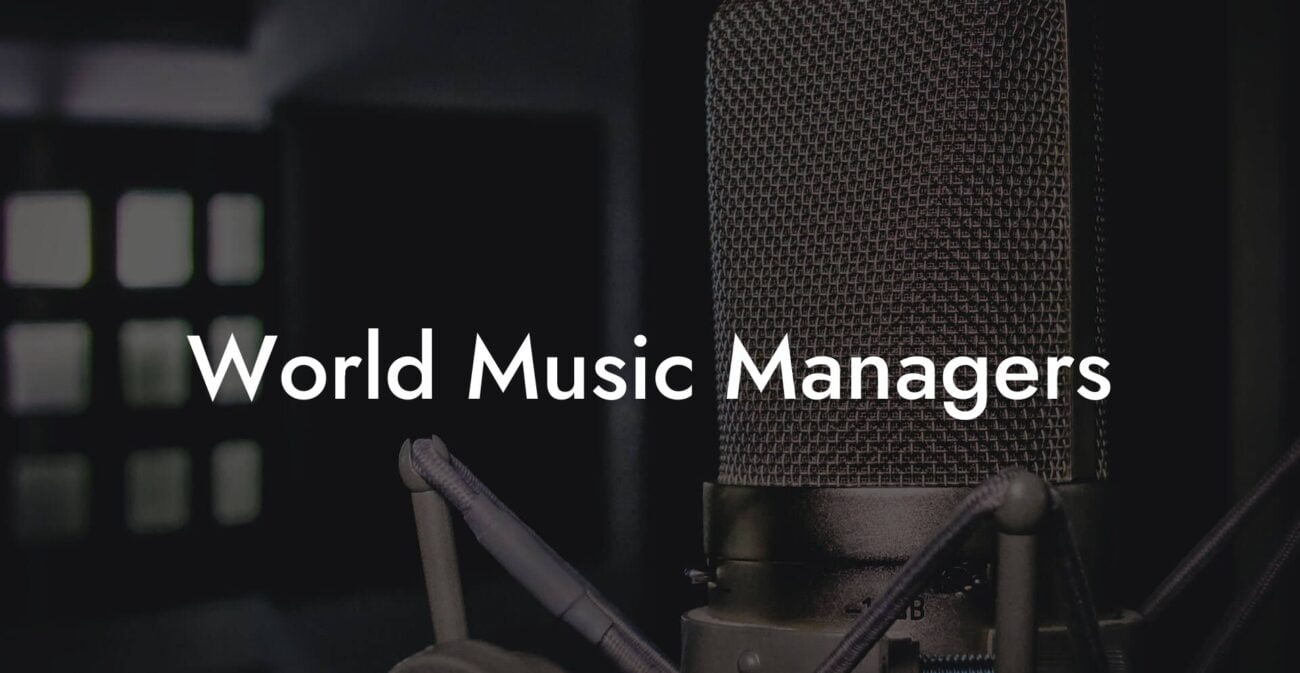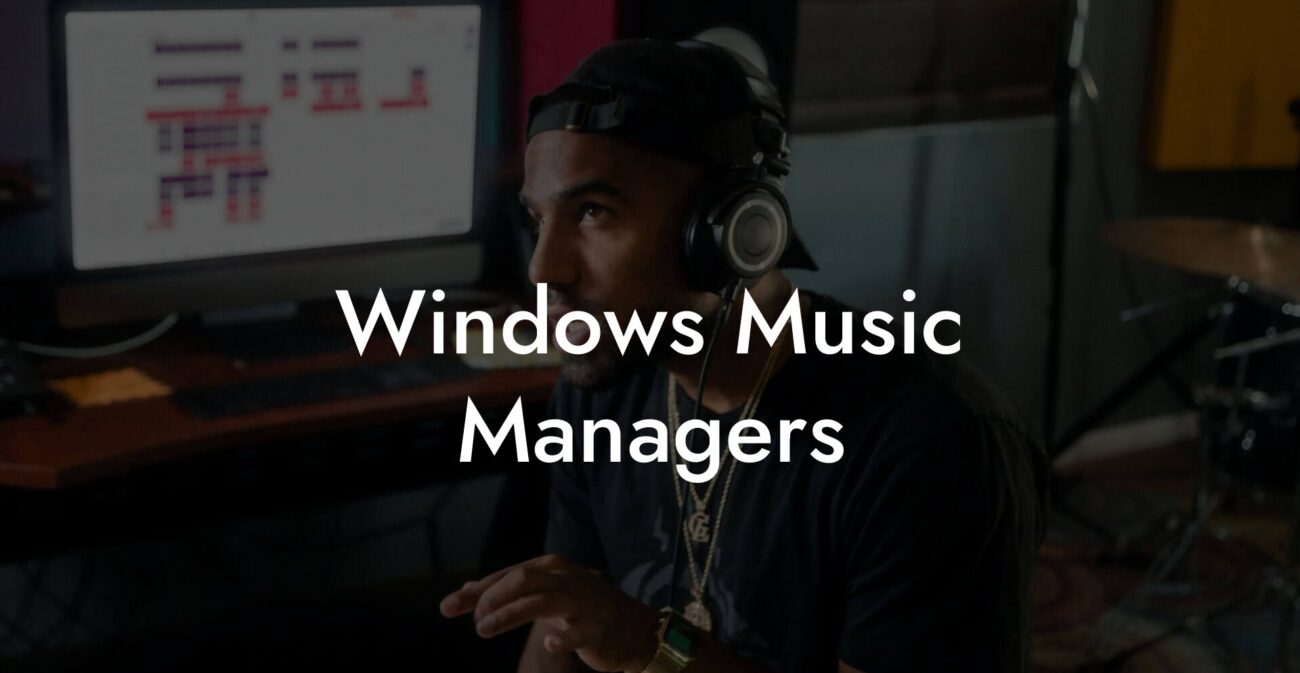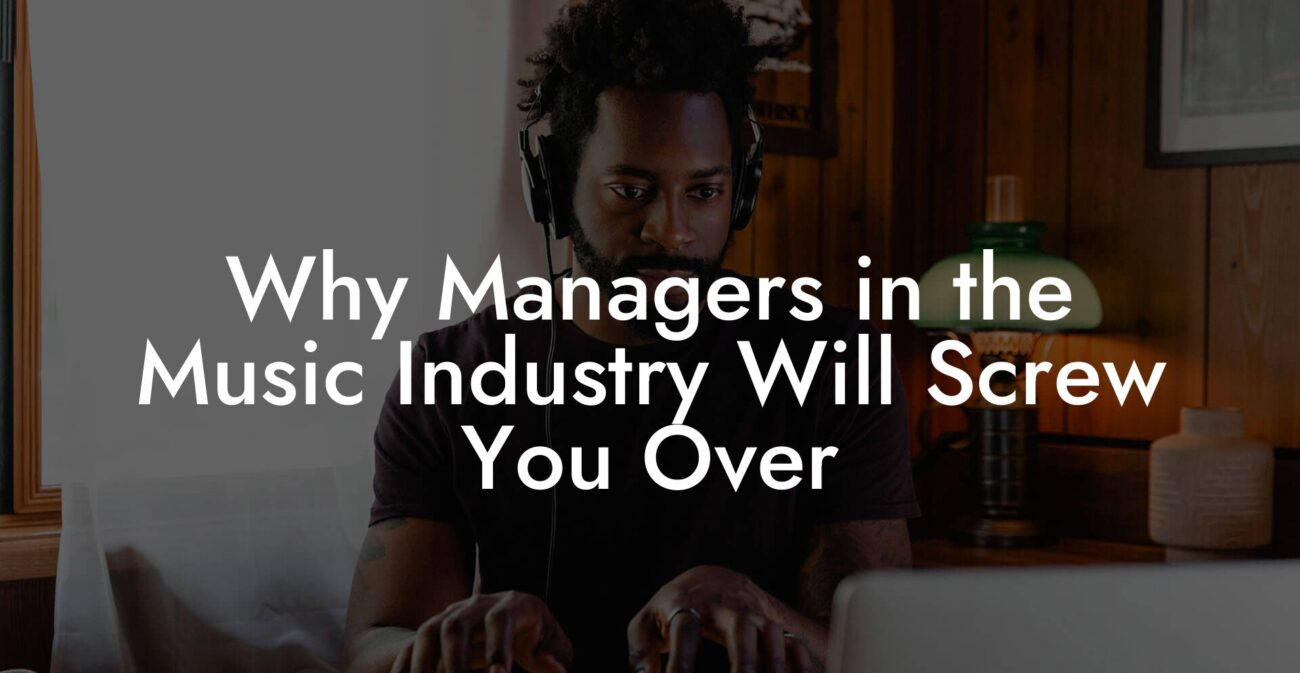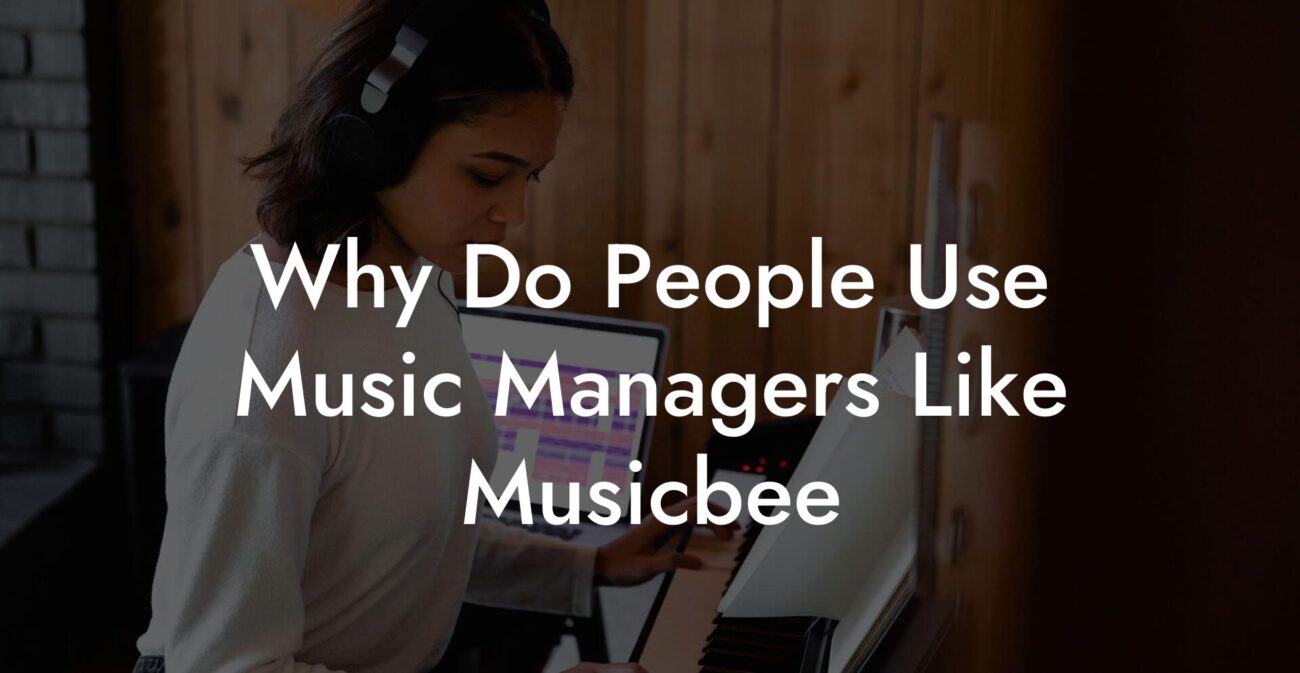Songwriting Advice
What Role Do Managers Play in the Music Industry
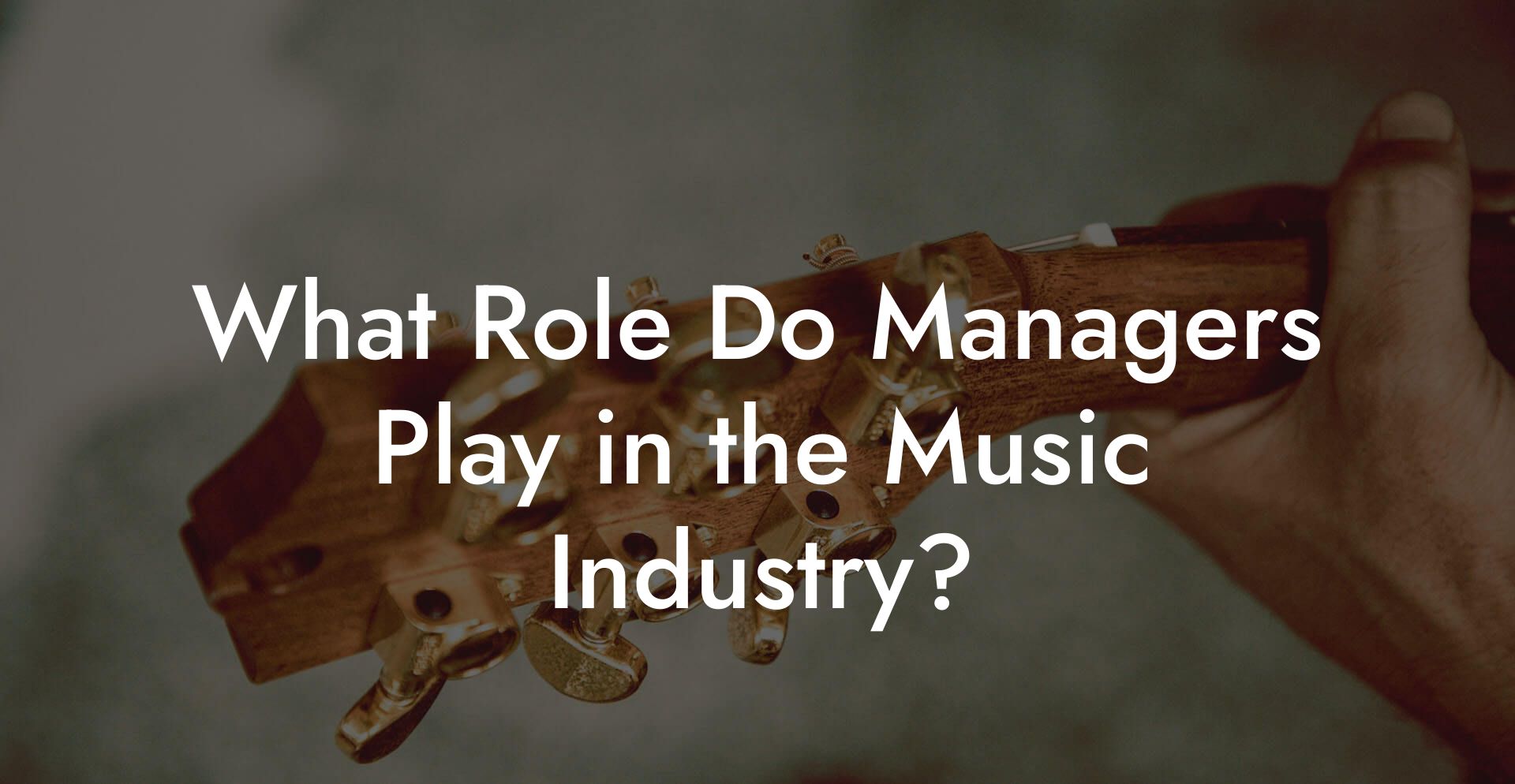
Ever wondered how your favorite artists navigate the wild, unpredictable realm of the music industry? Behind every chart-topping hit, sold-out tour, and viral social media moment lies a secret ingredient, a rockstar manager, the unsung hero of the music world. In this deep-dive pillar page, we’re pulling back the curtain on the dynamic, multifaceted role managers play in the music industry. Buckle up for an entertaining, no-holds-barred exploration into how these savvy professionals balance creativity and commerce, guide artists through industry minefields, and sometimes even moonlight as part therapist, part strategic genius. Whether you’re a budding musician using Lyric Assistant to pen your next hit or simply a curious fan, prepare to see music management in an entirely new light.
Quick Interruption: Ever wondered how huge artists end up fighting for their own songs? The answer is in the fine print. Learn the lines that protect you. Own your masters. Keep royalties. Keep playing shows without moving back in with Mom. Find out more →
Quick Interruption: Ever wondered how huge artists end up fighting for their own songs? The answer is in the fine print. Learn the lines that protect you. Own your masters. Keep royalties. Keep playing shows without moving back in with Mom. Find out more →
Quick Links to Useful Sections
- The Evolution of the Music Manager: From Backstage to Center Stage
- The Many Faces of Music Management
- Why Every Musician Needs a Manager (Even if You’re a DIY Star)
- The Creative Lifeline: How Managers Empower Artists
- Charting a Course in the Digital Age: The Manager's New Toolkit
- Managing the Business Side: Contracts, Gigs, and Green Light Moments
- The Unsung Hero: Handling Crises and Keeping It Real
- From Negotiator to Mentor: The Personal Touch of Music Managers
- Case Studies: How Music Managers Turn Challenges into Chart-Topping Triumphs
- Case Study 1: The Indie Sensation’s Leap to Stardom
- Case Study 2: Revitalizing a Veteran Artist’s Career
- Case Study 3: Navigating Controversy with Poise
- Building the Ultimate Team: When and How to Hire a Music Manager
- Key Qualities to Look for in a Music Manager
- Resources and Community Support: Your Next Steps
- Looking Ahead: The Future of Music Management
- Music Managers: The Unsung Orchestrators of Your Creative Symphony
- Integrative Music Management FAQs: Your Questions Answered
- Your Next Step: Embrace the Power of Strategic Music Management
The Evolution of the Music Manager: From Backstage to Center Stage
In the early days of rock ‘n’ roll, music managers were often the loud, larger-than-life figures handling rough negotiations and booking gritty gigs at smoky bars. Today, however, the role of a music manager has morphed into an intricate blend of artistry, business acumen, and digital wizardry. No longer limited to just securing stage time, managers now navigate the murky waters of social media algorithms, streaming revenue models, and branding strategies, all while keeping an eye on creative authenticity.
This evolution mirrors the changing landscape of the music industry itself, a space where the lines between art and enterprise blur more each day. For millennial and Gen Z artists, understanding this transformation is crucial. With technology at every turn, the modern manager is as much a tech-savvy entrepreneur as they are a mentor and advocate.
By combining old-school industry know-how with cutting-edge digital tactics, today’s music managers empower artists to not only chase their creative dreams but also build sustainable, long-lasting careers. Think of them as the ultimate collaborators who aren’t afraid to roll up their sleeves and get into the nitty-gritty of contract details, tour logistics, and viral video concepts.
The Many Faces of Music Management
Just like the genre-spanning world of music itself, there isn’t a one-size-fits-all description of a music manager. Their roles can be as diverse as the artists they represent, seamlessly adapting to the unique needs of each talent. Here are some common types of music managers and what sets them apart:
- Personal Managers: The all-in-one problem solvers who closely guide every aspect of an artist’s career. They’re your go-to for everything from career strategy and creative direction to networking and emotional support.
- Tour Managers: The logistical ninjas responsible for planning and managing tours. Their day-to-day duties can range from arranging travel and accommodations to coordinating performance schedules and on-site crises.
- Business Managers: The financial gurus who handle budgets, taxes, and royalty payments. They ensure that every note sung is backed by sound fiscal planning.
- Marketing and Digital Managers: These managers focus on leveraging social media, digital platforms, and branding strategies to catapult an artist’s presence in a crowded, interconnected world.
Each type offers a unique flavor of support, and sometimes artists work with a combination of these professionals to create a full-spectrum management team. What remains consistent, however, is the manager’s role as a trusted advisor and quarterback, orchestrating all facets of an artist’s journey.
Why Every Musician Needs a Manager (Even if You’re a DIY Star)
For those who prefer a DIY vibe, crafting lyrics on Lyric Assistant and sharing their tunes via social media, the idea of a music manager might feel like a luxury reserved for mainstream stars. But here’s the kicker: a good manager isn’t a sign that you’re no longer in control of your artistry. Instead, they’re a catalyst for growth, offering insights that help you scale your creative operation without sacrificing your authentic sound.
Here’s how partnering with a manager can level up your music career:
- Strategic Guidance: Managers help you set realistic goals and craft a long-term strategy that balances artistic expression with sound business decisions.
- Industry Connections: In a world where networking is everything, managers open doors to record labels, publishers, booking agents, and collaborators, all of which can accelerate your career growth.
- Negotiation Skills: From contract discussions to securing better tour deals, a manager is your personal advocate who ensures you get fair treatment and compensation.
- Crisis Management: When unexpected challenges arise, like a cancelled show or a social media mishap, a seasoned manager is ready with solutions to keep you afloat.
- Creative Support: Yes, they can offer creative input too! By providing honest feedback and fresh perspectives, managers help you refine your sound and lyrics while staying true to your vision.
Even if you’re navigating the indie scene on your own, adopting some of your favorite manager’s strategies can be a game changer. It’s all about learning to balance business smarts with artistic passion.
The Creative Lifeline: How Managers Empower Artists
Let’s face it: writing lyrics and composing melodies is beautiful, but the road to turning those creative sparks into a full-blown career can be riddled with bumps, potholes, and the occasional detour. This is where managers shine as creative lifelines. They allow artists the freedom to focus on what they do best, making music, by handling the myriad of supporting tasks that can distract from the creative process.
Imagine this: you’re in the zone, working on your next chartbuster with the help of Lyric Assistant, but then there’s the looming stress of social media metrics, contract negotiations, and gig bookings. A stellar manager steps in, takes on these responsibilities, and creates a safe space for your creativity to flourish without compromise.
With a manager in your corner, you get to embrace bold new ideas while knowing that someone is meticulously balancing your schedule, securing crucial partnerships, and making strategic decisions that drive your career forward. They’re the yin to your creative yang, letting you focus on your art while ensuring the business side never falls by the wayside.
Charting a Course in the Digital Age: The Manager's New Toolkit
Today’s music landscape is driven by digital innovation. Streaming platforms, social media, and viral trends have reshaped how music is consumed and promoted. In this brave new world, music managers have had to evolve their skill set to include a degree of tech-savviness that would have been unimaginable a few decades ago.
Digital tools and analytics now play a central role in a manager’s toolkit. Here’s how they leverage technology to keep artists ahead:
- Data-Driven Decisions: With detailed analytics from streaming services and social media platforms, managers can pinpoint what's resonating with audiences and adjust strategies in real time. This means your next single isn’t just a creative leap, it’s a calculated move based on cold, hard numbers.
- Social Media Mastery: Social networks are where trends are born and careers are made. Managers craft and execute digital marketing strategies that boost your online presence, engage your fanbase, and attract new listeners.
- Digital Branding: From logo design to website content and merchandise, managers work with branding experts to build a compelling visual and narrative identity that stands out in a saturated market.
- Virtual Tours and Livestreams: The global pandemic taught the industry that live events can go virtual. Managers now coordinate livestream concert events and virtual meet-and-greets, ensuring that your fans stay connected no matter where they are in the world.
This tech-driven approach not only amplifies your reach and accessibility but also ensures that your career adapts to an ever-changing digital ecosystem. For modern musicians, having a manager who is fluent in the language of technology is as critical as their songwriting prowess.
Managing the Business Side: Contracts, Gigs, and Green Light Moments
Beyond the creative and digital realms, a critical function of a music manager is to steer the business ship. This involves a delicate dance of juggling contracts, booking gigs, navigating the labyrinth of finance, and seizing those proverbial “green light” moments when opportunities arise.
Consider these key business responsibilities:
- Contract Negotiation: Whether it’s with record labels, publishers, or booking agents, managers are well-versed in the art of negotiation. They ensure that deals are both favorable and sustainable, safeguarding your interests while setting the stage for long-term success.
- Booking and Scheduling: The music industry doesn’t sleep, and neither do managers when it comes to ensuring that you’re performing at the right venues, festivals, and events that align with your brand. They handle the logistics of tour planning, promotional events, and media appearances, so you can remain laser-focused on your craft.
- Financial Oversight: Money matters can make or break a career. Managers work closely with business or financial managers to monitor revenue streams, from touring income to streaming royalties, and plan budgets that fuel growth without compromising artistic integrity.
- Brand Partnerships and Sponsorships: Collaborating with brands that resonate with your audience can open up new revenue streams. Managers identify and negotiate partnership deals that not only bring in cash but also enhance your brand image in the public eye.
Navigating contracts and bookings might seem mundane compared to the thrill of creative expression, but these tasks are the backbone of a sustainable music career. With a manager finely tuned to both the artistic and pragmatic sides of the industry, you can trust that your business affairs are in capable hands.
The Unsung Hero: Handling Crises and Keeping It Real
In an industry driven by trends and instantaneous fame, crises are inevitable. Whether it’s a poorly reviewed album drop, a cancelled tour, or social media controversy, problems tend to pop up when you least expect them. Enter the crisis manager, a specific role often filled by your manager, whether officially or as part of their everyday responsibilities.
Here’s how managers handle crises with a cool head and a keen sense of humor:
- Rapid Response: When a problem rears its ugly head, a manager springs into action. Their job is to quickly assess the situation, communicate with stakeholders, and develop a response plan that minimizes damage and sets things right.
- Damage Control: Crisis management isn’t just about putting out fires, it’s about strategic communication. Managers know how to spin a negative situation into an opportunity for growth, handling the media and social platforms with finesse.
- Maintaining Morale: Crises can take a toll on an artist’s confidence. By providing support, encouragement, and sometimes a much-needed dose of reality (backed by humor!), managers help artists stay grounded and focused on the bigger picture.
- Learning and Evolving: Once the dust settles, managers analyze what went wrong and refine future strategies. This cycle of continuous improvement is vital in an industry where the only constant is change.
A crisis can feel like a career-ending nightmare, but with a dedicated manager in your corner, even the darkest moments come with a silver lining. Their ability to manage emergencies, keep the team calm, and pivot strategies ensures that setbacks are just setups for your next big comeback.
From Negotiator to Mentor: The Personal Touch of Music Managers
Beyond the boardrooms and digital dashboards, perhaps the most invaluable aspect of a music manager is their role as a mentor and personal confidant. The music business can be as emotionally taxing as it is exhilarating, and having someone who genuinely cares about your personal and professional growth makes all the difference.
Here’s what the personal side of music management brings to the table:
- Mentorship and Guidance: Managers often become trusted advisors who not only help shape your career but also contribute to your personal development. They offer candid feedback, help you navigate industry challenges, and celebrate your successes as if they were their own.
- Building Confidence: The music industry is famously tough. A supportive manager provides a sounding board for ideas, helps you overcome self-doubt, and reinforces your self-belief. This kind of encouragement is essential, especially during times when creative blocks or setbacks threaten to derail your momentum.
- Network Expansion: Personal relationships matter. Managers tap into their extensive network to connect you with seasoned professionals, potential collaborators, and even fellow artists who can influence your growth and open new opportunities.
- Lifestyle Support: Sometimes, it’s not just about music. Managers can even lend advice on balancing the demanding schedules of touring, recording, and personal life, helping you maintain a healthy, sustainable lifestyle in the unpredictable world of entertainment.
Through empathy, humor, and genuine investment in your success, managers become more than just business partners, they evolve into lifelong allies. This personal connection can often be the secret ingredient to truly unlocking your creative potential.
Case Studies: How Music Managers Turn Challenges into Chart-Topping Triumphs
Sometimes the best way to grasp the impact of a great manager is to look at real-life success stories. Below, we dive into several case studies that highlight how savvy management turned potential pitfalls into impressive victories for artists.
Case Study 1: The Indie Sensation’s Leap to Stardom
Indie darling Ava was known for her poignant lyrics and soulful melodies, but she was struggling to break through the noise of a saturated market. Enter her manager, Jamie, a dynamic professional with a knack for digital marketing and unorthodox promotional strategies. Jamie’s innovative use of social media campaigns and targeted streaming playlists quickly transformed Ava’s local gigs into viral sensation events. Not only did the strategic online presence lead to a significant increase in streams, but it also paved the way for international touring opportunities. Ava’s journey from a basement singer-songwriter to a global indie sensation is a testament to the life-changing impact of contemporary music management.
Case Study 2: Revitalizing a Veteran Artist’s Career
Rock legend Marcus had seen better days, his once-thunderous career had plateaued, and gig offers dwindled. Seeing untapped potential, his new manager, Taylor, set about rebranding Marcus with a modern twist while honoring his storied legacy. Taylor orchestrated a strategy involving intimate acoustic sets streamed live, behind-the-scenes social media content, and a remastered album release that reintroduced Marcus to a new, younger audience. The blend of nostalgia with modern digital outreach revived not only Marcus’ career but also his creative mojo. The veteran rocker now enjoys renewed relevance, performing before packed audiences who span multiple generations.
Case Study 3: Navigating Controversy with Poise
When pop sensation Leo found himself embroiled in a social media controversy that threatened to derail his career, his manager, Robin, stepped in as the crisis handler. Rather than letting the scandal spiral out of control, Robin crafted a transparent communication strategy that included an honest public apology, an emphasis on Leo’s charitable work, and a plan to engage with fans directly through Q&A sessions. With calm, considered actions and a touch of humor to defuse the tension, Robin managed to restore Leo’s credibility and even deepen the connection between him and his fans. Leo’s story illustrates that with the right manager, even the most challenging situations can evolve into powerful opportunities for growth.
These case studies reveal that music managers are not just dealmakers and work facilitators, they’re creative partners capable of orchestrating immense turnarounds in an artist’s narrative.
Building the Ultimate Team: When and How to Hire a Music Manager
So, you’ve been honing your craft on Lyric Assistant, and your vocals are killer, now the big question: when should you consider hiring a music manager? Timing is crucial, and bringing in a manager too early may feel like premature scaling, while waiting too long might mean missed opportunities.
Here are some key indicators that it might be time to level up with a manager on your team:
- Your Fanbase is Growing: Having a steadily increasing audience, whether through streaming platforms, social media, or live performances, signals that your music is resonating. A manager can help translate that momentum into scalable career moves.
- You’re Receiving More Offers Than You Can Handle: When booking gigs, taking interviews, or negotiating deals becomes overwhelming, it’s a clear sign that you need a dedicated professional to manage these opportunities for you.
- Your Creative Focus is Shifting: If you find that business tasks are encroaching on your creative time, it might be time to bring in someone who can handle the gears of management, freeing you to focus on writing those next big hits.
- You’re Ready for a Business Strategy: When your career has reached a point where strategic growth and financial planning become as important as creative output, a seasoned manager can provide the necessary balance between artistry and enterprise.
Once you’ve decided it’s time to hire, start by doing thorough research. Talk to fellow musicians, seek recommendations, and even attend industry events to meet potential managers. Remember, the right manager should not only understand your music but also align with your vision and values.
A good fit will feel less like a business contract and more like a dynamic, mutually beneficial partnership, one where both sides are committed to taking your artistry to new heights.
Key Qualities to Look for in a Music Manager
Not all managers wear capes, some wear really sharp suits. When scouting for the perfect fit, it’s essential to know what traits to prioritize. Here’s a rundown of the top qualities that can make a music manager a true asset to your career:
- Experience and Industry Know-How: Look for a manager with a track record and familiarity with the modern music ecosystem. Whether they have decades of experience or a fresh perspective from emerging indie scenes, thorough industry knowledge is a must.
- Strong Communication Skills: You want someone who can clearly articulate ideas, negotiate effectively, and act as a bridge between you and other industry players. Transparency and open dialogue are critical for a productive relationship.
- Passion for Your Music: Genuine enthusiasm is contagious. A manager who is truly invested in your creative journey will go the extra mile to promote your work and amplify your unique voice.
- Network Leverage: A manager’s network is your network. Their connections to booking agents, record labels, producers, and media outlets can unlock opportunities that might otherwise remain out of reach.
- Resilience and Problem-Solving Skills: The music world is full of surprises. A great manager is adaptable, cool under pressure, and capable of turning setbacks into stepping stones for continued success.
- Digital and Social Media Savvy: With the digital era reshaping the industry, your manager should have a pulse on the latest online trends, social media strategies, and data analytics to guide your branding and reach.
Trust your instincts when selecting a manager. The right person will complement your strengths, fill in the gaps, and help you navigate the maze of the music industry with style and confidence.
Resources and Community Support: Your Next Steps
Embarking on a music career without a savvy manager is like trying to navigate a labyrinth without a map. Thankfully, there’s a wealth of resources out there to help you make informed decisions and build connections in the industry. Here are some actionable next steps for both emerging and established musicians:
- Online Communities and Forums: Engage with platforms like Reddit’s r/WeAreTheMusicMakers, music industry Facebook groups, or specialized forums where fellow musicians share advice, success stories, and opportunities.
- Industry Workshops and Webinars: Many organizations and experienced professionals host virtual events focusing on music management, digital branding, and legal rights. These are great opportunities to learn and network.
- Local Music Associations and Meetups: Connecting with local artist communities can provide insight into regional industry trends and lead to recommendations for reputable managers.
- Music Conferences and Festivals: Events such as SXSW, MIDEM, or even virtual summits gather industry professionals from around the globe. Attending these can help you identify potential managers and collaborators.
- Mentorship Programs: Look for mentorship opportunities through music associations or educational platforms. Engaging with a mentor can guide your path toward finding the right management team.
- Industry Publications and Blogs: Stay informed with outlets like Billboard, Rolling Stone, and industry blogs that often feature insights, interviews, and tips from successful managers.
Leveraging these resources not only empowers you with knowledge but also helps you build a support network that can be crucial for your career. Remember, in the modern music scene, collaboration and community are key ingredients to success.
For those using Lyric Assistant to create unforgettable lyrics, consider integrating insights from trusted managers and industry experts to further refine your creative process. Your evolution as an artist is supported at every step by these diverse community touchpoints.
Looking Ahead: The Future of Music Management
As we peer into the crystal ball of the music industry, one thing is abundantly clear: the role of the music manager is set to become even more central to artistic success. With emerging technologies like artificial intelligence, virtual reality concerts, and blockchain-based royalties reshaping the landscape, managers will need to be agile, innovative, and ready to harness these tools.
The future of music management is about striking the perfect balance between leveraging advanced technology and retaining the human touch that fuels creative collaborations. Imagine a world where data analytics and AI-powered insights predict trends even before they become mainstream, managers will be the strategic masterminds behind these bold predictions, guiding artists to explore uncharted territories while keeping their creative soul intact.
As the music industry continues to expand beyond traditional boundaries, managers will increasingly adopt hybrid roles, blending financial models with brand storytelling and digital innovation. This evolution promises not only a more immersive and dynamic career experience for artists but also richer content and deeper connections with fans worldwide.
Whether you’re dreaming of writing the next viral hit using Lyric Assistant or planning your first major tour, staying ahead means embracing this new era of music management. The future is collaborative, tech-driven, and just as unpredictable as your favorite mixtape.
Music Managers: The Unsung Orchestrators of Your Creative Symphony
In the end, the journey to musical greatness is a collaborative symphony where every note matters. Managers, with their blend of creative insight, business savvy, and digital expertise, are the conductors who ensure that every aspect of your career is in harmony. They enable you to focus fully on the art of songwriting, performance, and innovation, leaving behind the logistical headaches and administrative challenges.
So next time you’re tapping away on Lyric Assistant in the middle of the night, dreaming up lyrics that capture the essence of your soul, spare a thought for the unsung heroes behind the scenes. Whether planning a global tour, negotiating deals, or simply offering a much-needed pep talk when the industry gets rough, music managers are the steady force that turns creative sparks into blazing, long-lasting careers.
Embrace the journey, trust your team, and always remember: every hit song, every sold-out gig, and every breakthrough moment is the result of not only your talent but also the relentless hard work of the manager who’s been there every step of the way. Together, you’re not just making music, you’re shaping the future of the industry.
As you forge ahead in your musical journey, knowing the robust role music managers play can empower you to navigate challenges with confidence, seize unexpected opportunities, and keep the creative flame burning bright. Your career is a masterpiece in progress, and the support of a dedicated manager might just be the key to unlocking your full potential.
Integrative Music Management FAQs: Your Questions Answered
Here’s a roundup of frequently asked questions that dive deep into the multifaceted world of music management:
1. What exactly does a music manager do?
A music manager is responsible for guiding an artist’s career through strategic planning, contract negotiation, tour scheduling, digital branding, and even crisis management, effectively balancing the creative and business sides of the industry.
2. When should I consider hiring a music manager?
Consider hiring a manager when your fanbase is growing, your creative demands are increasing, and the business aspects of your career start to overwhelm you. A manager can help scale your operations while preserving your artistic integrity.
3. How do music managers help with digital marketing?
Modern managers leverage data analytics, social media strategy, and digital branding to build and engage an artist’s online community, ensuring your music reaches the right audience at the right time.
4. Can a manager also help with my creative process?
Absolutely. While managers are primarily focused on business strategy, many also offer creative insights, foster collaborations, and act as mentors to help refine your artistic vision.
5. Is it essential for independent artists to hire a manager?
While many independent artists thrive without one, having a manager can significantly lift the administrative load, allowing you to focus on your art. It’s all about whether you’re ready to take your music career to a larger scale.
6. What qualities should I look for in a good manager?
Look for experience, excellent communication skills, a passion for your music, a robust network, and the ability to navigate both digital trends and traditional music industry practices.
7. How do managers handle crises in an artist’s career?
From quick crisis-response strategies to effective public relations, managers are adept at mitigating damage, communicating transparently with fans and media, and turning setbacks into opportunities for growth.
8. Are there different types of music managers?
Yes, from personal managers and tour managers to business and digital marketing experts, different types of managers focus on various aspects of an artist’s career. Many artists benefit from a team that covers all these bases.
9. How has the role of music managers changed in the digital age?
Digital technology has transformed music management by emphasizing data-driven decision-making, social media engagement, and online brand development, making managers more tech-savvy than ever.
10. Can I collaborate with a manager while still maintaining creative control?
Yes, the ideal partnership between an artist and a manager enhances creative freedom by tackling business-related tasks, allowing you to focus fully on crafting and performing your art.
Your Next Step: Embrace the Power of Strategic Music Management
The world of music management is as vibrant and multifaceted as the music itself. With the rapid changes driven by digital innovation and shifting consumer habits, a good music manager becomes an indispensable ally. They hold the keys to unlocking opportunities, bridging the gap between creative genius and business success.
Whether you're an emerging artist penning your first lyrics on Lyric Assistant or a seasoned professional ready to scale new heights, understanding the multifaceted role of a music manager is essential. They’re the navigators of the industry’s twists and turns, blending business acumen with creative insight to guide you through every challenge.
As you embark on your musical journey, remember that every great track and every unforgettable performance is built on a solid foundation of vision, hard work, and smart management. Your career is a collaborative masterpiece, a blend of your unique artistry and the strategic guidance of those who believe in your talent.
So, whether you’re gearing up for a digital breakout or planning an international tour, let the energy of your music fuel your passion for excellence. Embrace a future where you’re more than just a musician, you're an innovator, a storyteller, and a trailblazer in a musical landscape that’s continuously evolving.
Step forward with confidence and let your manager be the driving force that transforms dreams into realities. Your path to creative and professional fulfillment begins with understanding, appreciating, and strategically partnering with the unsung heroes of the music industry.



